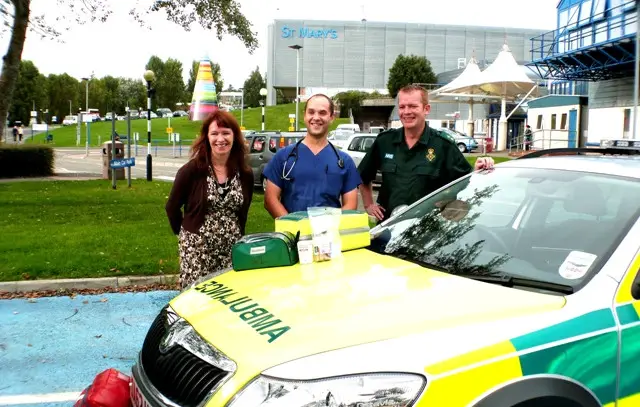This in from the IW NHS, in their own words. Ed
The Trust’s ‘PrePip’ project enables specially trained Paramedics to deliver, under strict guidelines, intravenous high dose antibiotics to patients who have suspected sepsis and who are on, or have recently had, chemotherapy or have a urinary catheter.
These patients are particularly susceptible to rapidly evolving sepsis. The Trust has now treated four patients, believed to possibly be the first examples of such treatment, in the community delivered by an ambulance service, in the ‘northern hemisphere’.
What is Sepsis?
Sepsis is a life-threatening illness caused by the body overreacting to an infection. The body’s immune system goes into overdrive, setting off a series of reactions that can lead to widespread inflammation (swelling) and blood clotting.
Sepsis can lead to shock, multiple organ failure and death especially if not recognised early and treated promptly. Worldwide, sepsis kills thousands of people every single day.
In the United Kingdom alone, it is estimate that around 37,000 patients die each year from sepsis. To put this into perspective, this means that more people die annually from sepsis than from lung cancer, or from bowel cancer and breast cancer combined.
A third of patients admitted to intensive care have sepsis
Senior House Officer in the Emergency Department at St. Mary’s Hospital on the Isle of Wight, Dr John Pike said:
“We know that treating suspected Sepsis much earlier saves patient’s lives and prevents admissions to intensive care – a third of patients admitted to intensive care have sepsis. Our integrated services here on the Island – all hosted in Isle of Wight NHS Trust – make it possible for us to develop and implement new initiatives quickly.
“Previously patients have had to wait until they arrive at hospital to receive these special antibiotics intravenously. For every hours delay in diagnosis and treatment the risk of death from sepsis increases substantially.”
Treatment to be delivered by Paramedic
The Trust has developed guidance for staff which enables the treatment to be delivered by Paramedics under Patient Group Directions (PGDs). All the Trust’s rapid response vehicles (cars) have been equipped with kits to deliver the treatment and all ambulance staff have received training to recognise the symptoms of sepsis and how to treat it.
Paramedics who drive the Trust’s rapid response vehicles are at the front line of the programme. This novel approach, integrating front-line ambulance staff into sepsis treatment buys previous time and will certainly save lives.
Isle of Wight Ambulance Service Clinical Support Officer Tholli Wood said:
“A call to the Trust’s integrated urgent care hub on either 999 or 111 activates the new service. The call can be made by the patient, a member of staff in the Trust’s cancer service including the Chemotherapy Suite or by a GP. The Urgent Care Hub may dispatch a rapid response vehicle to enable the patient to be treated at home.
“This is likely to be followed up by an Emergency Ambulance to transfer the patient to hospital for further treatment and tests but the important early diagnosis and treatment is achieved reducing the longer term problems for the patient.”
Exciting and innovative development
Executive Medical Director at Isle of Wight NHS Trust, Dr Mark Pugh, said:
“This new service to the NHS, which has been developed on the Island, underlines the benefits of our unique integrated service. It has taken just four months to develop and for the first patient to benefit.
“This is an exciting and innovative development which will lead to patients starting potentially life saving treatment faster, speeding their recovery and a reducing a need for intensive care treatment.”
Knowing the symptoms
Symptoms of sepsis usually develop quickly and include:
- a fever or high temperature over 38C (100.4F)
- chills
- a fast heartbeat
- fast breathing
In severe cases you may notice:
- you feel dizzy when you stand up
- confusion or disorientation
- nausea and vomiting
Although anybody can develop sepsis from a minor infection, some people are more vulnerable, such as those:
- with a medical condition or receiving medical treatment (e.g. chemotherapy) that weakens their immune system
- who are already in hospital with a serious illness
- who are very young or very old
- who have just had surgery or who have wounds or injuries as a result of an accident





